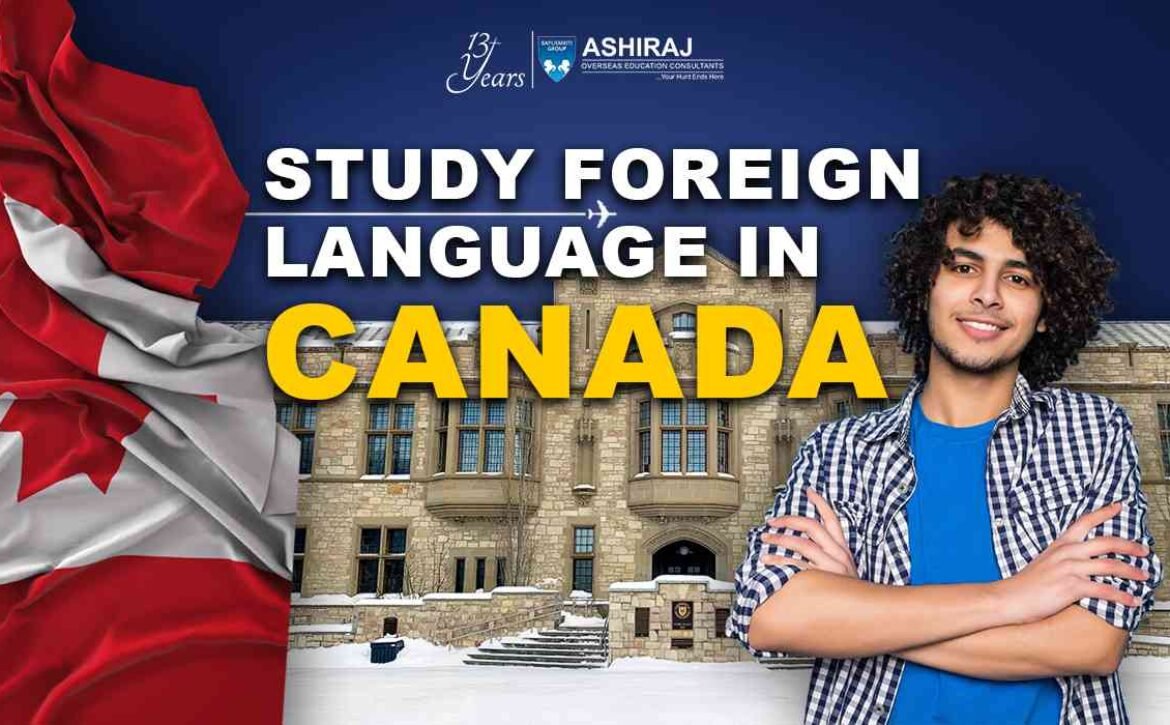
Foreign Language in Canada
In Canada, the embrace of foreign languages reflects the country’s rich multicultural tapestry. The linguistic landscape of Canada is a mosaic, where languages from around the world intertwine, reflecting the diverse backgrounds of its inhabitants. From coast to coast, Canadians value linguistic diversity, recognizing the importance of foreign languages in fostering cultural understanding and global connections. The prominence of foreign languages in Canada not only enhances communication but also strengthens ties with international communities, facilitating diplomacy, trade, and cultural exchange.
Foreign Language in Canada is not merely a practical skill but a gateway to cultural immersion and cross-cultural understanding. In classrooms, workplaces, and communities across the country, the appreciation for foreign languages is evident, as Canadians strive to embrace linguistic diversity and promote multilingualism. As Canada continues to evolve as a global player, proficiency in foreign languages remains a valuable asset, opening doors to opportunities in diplomacy, trade, tourism, and beyond. Embracing foreign languages in Canada is not just a choice but a celebration of the country’s pluralistic identity and its commitment to inclusivity on the world stage.
Why Study Foreign Language in Canada?
- Multicultural Environment: Canada’s diverse population makes it an ideal place to study foreign languages. Engaging with people from various cultural backgrounds provides immersive language learning opportunities.
- Global Opportunities: Proficiency in a foreign language enhances your competitiveness in the global job market. Canada’s multicultural society fosters connections with international communities, creating avenues for career growth and global networking.
- Cultural Enrichment: Learning a foreign language in Canada offers more than just linguistic skills; it provides insight into different cultures, traditions, and perspectives. It broadens your understanding of the world and fosters cross-cultural appreciation.
- Enhanced Communication: In a globalized world, effective communication is crucial. Studying a foreign language in Canada equips you with the ability to communicate with people from diverse backgrounds, both locally and internationally.
- Academic Opportunities: Many Canadian universities offer foreign language programs, allowing students to explore their interests and deepen their understanding of other cultures. These programs often include opportunities for language immersion and study abroad experiences.
- Personal Growth: Learning a foreign language challenges you intellectually and encourages personal growth. It boosts cognitive abilities, enhances problem-solving skills, and fosters adaptability—all valuable qualities in today’s interconnected world.
Studying a foreign language in Canada opens doors to a world of opportunities, enriching your academic, professional, and personal experiences while contributing to the vibrant tapestry of Foreign Language in Canada.
Top Universities to Study Foreign Language in Canada
University | QS World University Ranking 2023 | Type of University | Average Annual Fees | Programs Offered |
University of Toronto | 20 | Public | $30,000 – $50,000 | Linguistics, Language Studies, Translation Studies |
University of British Columbia | 28 | Public | $25,000 – $40,000 | Modern Languages, Applied Linguistics, Intercultural Studies |
McGill University | 35 | Public | $35,000 – $45,000 | Language and Literature, Translation, Second Language Education |
University of Montreal | 45 | Public | $20,000 – $35,000 | French Studies, Language Teaching, Comparative Literature |
University of Alberta | 95 | Public | $20,000 – $30,000 | Linguistic Anthropology, Language Education, Second Language Acquisition |
Studying foreign languages in Canada offers a myriad of opportunities, and choosing the right university is crucial for a rewarding academic journey. Here’s a list of the top universities in Canada for Foreign Language in Canada based on the QS World University Rankings 2023:
- University of Toronto: Renowned for its academic excellence, the University of Toronto offers a range of programs in linguistics, language studies, and translation studies.
- University of British Columbia: With a strong emphasis on global perspectives, UBC provides programs in modern languages, applied linguistics, and intercultural studies.
- McGill University: Situated in Montreal, McGill offers programs in language and literature, translation, and second language education, enriching students’ understanding of Foreign Language in Canada.
- University of Montreal: Known for its vibrant bilingual community, the University of Montreal offers programs in French studies, language teaching, and comparative literature, reflecting the diverse linguistic landscape of Canada.
- University of Alberta: With a focus on linguistic anthropology, language education, and second language acquisition, the University of Alberta prepares students to navigate the complexities of Foreign Language in Canada and beyond. Choose one of these esteemed institutions to embark on your journey of linguistic and cultural exploration in Canada.
Course Curriculum for Foreign Language in Canada
- Language Proficiency: Foreign language courses in Canada typically focus on developing proficiency in reading, writing, speaking, and listening skills. Emphasis is placed on practical communication in real-life situations.
- Cultural Studies: Understanding the cultural context behind the language is an integral part of the curriculum. Students delve into literature, history, and traditions of the countries where the language is spoken.
- Linguistics: Courses often include linguistic studies, exploring the structure, grammar, and phonetics of the foreign language. Students gain insights into language evolution and variation.
- Translation and Interpretation: Many programs offer courses in translation and interpretation, equipping students with the skills to accurately convey meaning between languages.
- Practical Applications: The curriculum often incorporates practical applications of the language, such as role-plays, group discussions, and language immersion activities.
- Technology Integration: With the advancement of technology, courses may integrate language learning software, online resources, and multimedia tools to enhance learning experiences.
- Study Abroad Opportunities: Some programs offer study abroad opportunities, allowing students to immerse themselves in the language and culture firsthand.
Foreign Language in Canada courses provide a comprehensive learning experience, combining linguistic proficiency, cultural understanding, and practical skills necessary for effective communication in diverse contexts. Through engaging curriculum and immersive experiences, students gain a deeper appreciation for language and culture while preparing for global opportunities.
Eligibility Criteria & Admission Requirements for MS in Foreign Language in Canada
- Language Proficiency Tests:
Applicants are required to demonstrate proficiency in English or French. Commonly accepted language tests include IELTS (International English Language Testing System) or TOEFL (Test of English as a Foreign Language).
Test | Minimum Score |
IELTS | 6.5 |
TOEFL | 90 |
- Academic Qualifications:
A bachelor’s degree from a recognized institution is typically required. Some programs may have specific academic prerequisites related to language studies.
- Standardized Tests:
Depending on the program, applicants may need to submit scores for standardized tests like GRE (Graduate Record Examination) or GMAT (Graduate Management Admission Test).
Test | Minimum Score |
GRE | 300 |
GMAT | 550 |
- Passport & Student Visa:
A valid passport is essential for international students. Additionally, securing a student visa is crucial for enrollment. Applicants need to adhere to Canadian immigration regulations.
- Academic Certificates:
Transcripts and certificates from previous academic institutions must be submitted for evaluation during the application process.
- Work Experience (if applicable):
Some programs may require or consider relevant work experience, especially for advanced or specialized language courses.
Ensuring compliance with these eligibility criteria is vital for prospective students aiming to pursue Foreign Language in Canada. The specified language proficiency, academic qualifications, and additional documentation contribute to a comprehensive evaluation of applicants, ensuring a conducive learning environment for language studies in the Canadian academic landscape.
Documents Required for Studying Foreign Language in Canada
- Passport:
A valid passport is essential for international students seeking to study Foreign Language in Canada. It serves as proof of identity and nationality.
- Letters of Recommendation (LOR):
Applicants typically need to submit two or more LORs from academic or professional referees who can attest to their abilities, character, and suitability for the program.
- Statement of Purpose (SOP):
An SOP provides insight into the applicant’s motivations, academic background, career goals, and reasons for choosing the specific language program in Canada.
- Curriculum Vitae (CV):
A comprehensive CV outlines the applicant’s educational qualifications, work experience, skills, achievements, and any relevant extracurricular activities.
- Official High School Transcripts:
Transcripts from high school or equivalent institutions are required to assess the applicant’s academic performance and eligibility for admission.
- Educational Certificates:
Certificates or diplomas from previous educational institutions validate the applicant’s academic credentials and qualifications.
- Work Experience Certificate:
If applicable, a work experience certificate provides evidence of relevant professional experience, which may be considered during the admission process.
- Proof of Financial Resources:
Applicants must demonstrate sufficient financial resources to cover tuition fees, living expenses, and other related costs during their stay in Canada.
Ensuring the timely submission of these documents is crucial for a smooth application process and successful enrollment in a Foreign Language in Canada program.
Admission Process for Foreign Language in Canada
- Research and Selection:
Research various universities and language programs in Canada to find the best fit for your interests and career goals related to Foreign Language in Canada.
- Review Admission Requirements:
Familiarize yourself with the specific admission requirements of each university and program, including language proficiency tests, academic qualifications, and supporting documents.
- Prepare Required Documents:
Gather necessary documents such as passport, transcripts, letters of recommendation, statement of purpose, curriculum vitae, and proof of financial resources according to the program’s requirements.
- Language Proficiency Tests:
Take language proficiency tests like IELTS or TOEFL and achieve the minimum required scores to demonstrate English or French proficiency, essential for studying Foreign Language in Canada.
- Submit Application:
Complete the online application form for your chosen program and university. Ensure all required documents are accurately submitted before the application deadline.
- Wait for Admission Decision:
After submitting your application, wait for the university to review your materials. Admission decisions may take several weeks to months, depending on the institution.
- Acceptance and Enrollment:
If accepted, follow the instructions provided by the university to confirm your acceptance and proceed with enrollment procedures for Foreign Language in Canada programs.
- Apply for Student Visa:
Once accepted, apply for a student visa through the Canadian government’s immigration portal. Provide necessary documentation and pay applicable fees to obtain your visa.
- Plan for Arrival:
Make necessary arrangements for accommodation, travel, and other logistics for your arrival in Canada to commence your Foreign Language in Canada studies.
Following these steps diligently ensures a smooth admission process and sets the foundation for a successful academic journey in Foreign Language in Canada programs.
“Education is the most powerful weapon which you can use to change the world.”
Nelson Mandela
Cost of Foreign Language Course in Canada
- Tuition Fees:
Tuition fees for Foreign Language in Canada programs vary depending on the university, program duration, and level of study. On average, international students can expect to pay between CAD 15,000 to CAD 30,000 per year.
- Living Expenses:
Living expenses in Canada include accommodation, food, transportation, utilities, and miscellaneous expenses. Costs vary based on the city and lifestyle, with major cities like Toronto and Vancouver generally having higher expenses.
- Accommodation:
Options for accommodation include on-campus residences, off-campus apartments, homestays, and shared accommodations. Costs range from CAD 600 to CAD 1,500 per month, depending on the type and location.
- Health Insurance:
International students are required to have health insurance coverage while studying in Canada. Many universities offer health insurance plans, which cost approximately CAD 600 to CAD 1,000 per year.
- Books and Supplies:
Students should budget for textbooks, study materials, and other supplies required for their language courses. Costs can range from CAD 500 to CAD 1,000 per year, depending on the program requirements.
- Additional Expenses:
Miscellaneous expenses may include visa application fees, transportation within Canada, entertainment, and personal expenses. It’s essential to budget for unforeseen costs to manage finances effectively while studying Foreign Language in Canada.
Scholarships for Foreign Language Courses in Canada
Scholarship Name | Amount | Application Deadline |
Trudeau Foundation Scholarships | Up to CAD 60,000 per year | December 1st |
Vanier Canada Graduate Scholarships | CAD 50,000 per year | November 3rd |
Ontario Graduate Scholarship (OGS) | Up to CAD 15,000 per year | Varies by institution |
Quebec Merit Scholarship for Foreign Students | Up to CAD 25,000 per year | Varies by institution |
University-specific Scholarships | Varies | Varies by institution |
Scholarships For Foreign Language in Canada offer financial assistance to international students pursuing language studies in Canadian universities. Here’s a list of prominent scholarships along with their amounts and application deadlines:
- Trudeau Foundation Scholarships:
Amount: Up to CAD 60,000 per year
Application Deadline: December 1st
- Vanier Canada Graduate Scholarships:
Amount: CAD 50,000 per year
Application Deadline: November 3rd
- Ontario Graduate Scholarship (OGS):
Amount: Up to CAD 15,000 per year
Application Deadline: Varies by institution
- Quebec Merit Scholarship for Foreign Students:
Amount: Up to CAD 25,000 per year
Application Deadline: Varies by institution
- University-specific Scholarships:
Amount: Varies
Application Deadline: Varies by institution
Applying for these scholarships can significantly alleviate the financial burden of studying Foreign Language in Canada, providing opportunities for academic excellence and cultural immersion. Prospective students should carefully review eligibility criteria and deadlines to maximize their chances of securing financial support for their language studies in Canada.
Career Opportunities After Foreign Language in Canada
Job Profile | Average Salary (CAD) |
Language Teacher | $50,000 – $80,000 |
Translator/Interpreter | $45,000 – $70,000 |
Foreign Language Specialist | $60,000 – $90,000 |
International Relations Specialist | $65,000 – $100,000 |
Cultural Consultant | $55,000 – $85,000 |
Foreign Language in Canada opens doors to diverse career opportunities across various sectors. Here are some popular career paths along with their average salaries:
- Language Teacher:
Average Salary: $50,000 – $80,000
Language teachers instruct students in foreign languages, focusing on grammar, vocabulary, and conversation skills.
- Translator/Interpreter:
Average Salary: $45,000 – $70,000
Translators and interpreters facilitate communication between individuals or groups who speak different languages.
- Foreign Language Specialist:
Average Salary: $60,000 – $90,000
Foreign language specialists work in diverse fields, providing expertise in language acquisition, translation, and cultural adaptation.
- International Relations Specialist:
Average Salary: $65,000 – $100,000
International relations specialists facilitate diplomatic relations, cultural exchanges, and negotiations between countries and organizations.
- Cultural Consultant:
Average Salary: $55,000 – $85,000
Cultural consultants advise organizations on cultural sensitivity, diversity, and inclusion, helping bridge cultural gaps in a globalized world.
These career opportunities underscore the value of Foreign Language in Canada and its potential for personal growth, professional advancement, and cross-cultural understanding in today’s interconnected society.
Frequently Asked Questions About Foreign Language in Canada
Yes, Canadian universities offer a wide range of foreign language programs, including popular languages like French, Spanish, German, Chinese, Japanese, and many others.
While proficiency in English or French is generally required for international students, specific language proficiency requirements vary by program. Some programs may offer language courses for non-native speakers.
Yes, many universities and organizations in Canada offer scholarships and financial aid options for international students pursuing foreign language studies. It’s advisable to check with individual institutions for available scholarships.
Yes, proficiency in a foreign language can enhance your employability in various fields such as education, translation, interpretation, international business, diplomacy, and tourism.
The time it takes to become fluent in a foreign language varies depending on factors such as the language studied, your starting proficiency level, the intensity of the program, and your dedication to learning.
Yes, many Canadian universities offer language immersion programs, study abroad opportunities, and cultural exchange programs to provide students with immersive language learning experiences.
International students in Canada are usually allowed to work part-time during their studies and full-time during scheduled breaks, provided they meet certain eligibility criteria and obtain the necessary permits.
To apply for a student visa (study permit) in Canada, you must first receive acceptance from a Canadian university, then apply for the study permit through the Canadian government’s immigration website, providing necessary documents and paying applicable fees.
Yes, after completing your studies, you may be eligible to apply for a post-graduation work permit or extend your stay in Canada through other immigration pathways, depending on your circumstances and eligibility criteria.
Canada offers a multicultural environment, high-quality education system, diverse language programs, and opportunities for cultural immersion, making it an attractive destination for studying foreign languages. Additionally, Canadian qualifications are globally recognized.




